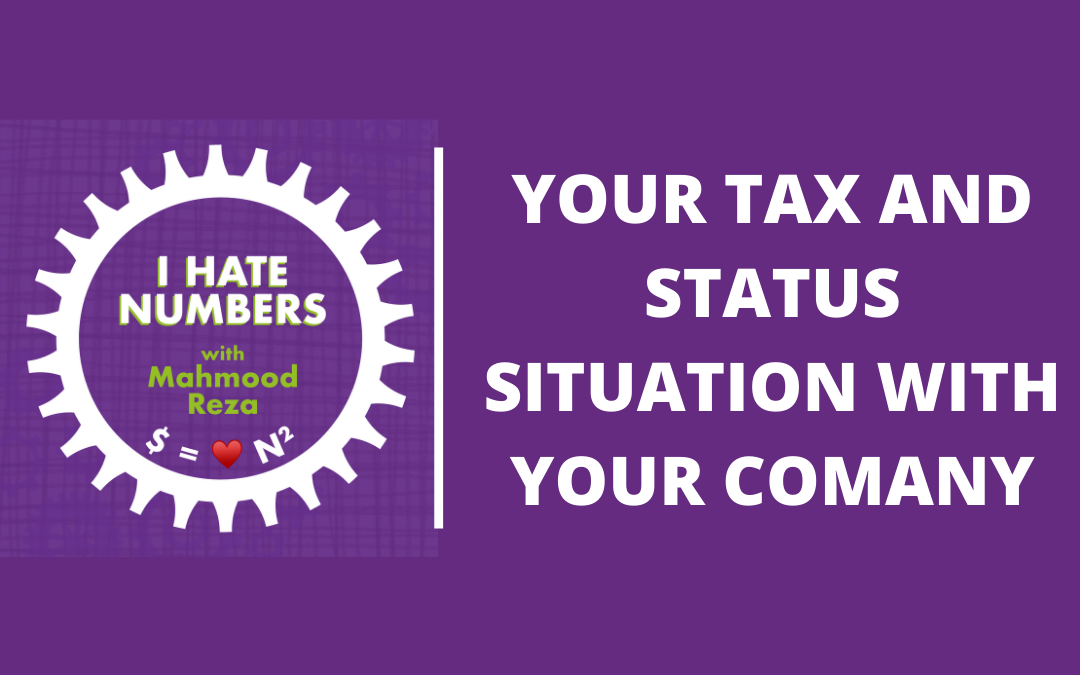Are you a self-employed individual, a freelancer or employer? Have you ever wondered what your tax and status situation is with your company? If so, this podcast is for you.
Whether you are classed as self-employed or a worker has a major bearing on tax. Most importantly it affects how you are paid, and your obligations pertaining to paying taxes.
The two main ways that you will earn money in your life. Either as worker/employee or running your own business. You run your business as a sole trader or as a limited company or mix and match them. Check out previous podcast episodes.
My focus for episode 56 of I Hate Numbers is personal service companies, and your status, and tax. Where your business provides services, for example, training, accounting, consulting, IT then you have a personal service company. If you sell products, then you do not have a personal service company.
Listen to find out more!
Why your status situation with your company is important?
Firstly, why is it relevant? I don’t mean are you cool, an upright citizen. More importantly, status is about whether you provide your client services as a worker or self-employed. Is this a contract of service or a contract for services?
Above all, remember, this is a three-way relationship, nothing dirty mind you. You do the work; your company invoices your client, and your client pays your company.
The gig economy, high profile cases like Uber have been about worker or self-employed status. Uber ended up at the Supreme court, it did not go Uber’s way, and Uber drivers were classified where they had been previously considered to be self-employed. One consequence is more tax money to the government, and less for Uber.
Your status decides your rights responsibilities, and more crucially, how much tax the government will collect and who calculates and pays it. Status tests have been here for an age. Calling yourself self-employed not going to cut the mustard.
In other words, if a contract for services, then your invoice is paid gross. In addition you have got greater opportunities for saving tax and tax planning.
Listen to find out more!
What does self-employed mean?
In normal everyday language it means working for yourself, being your own boss. However, we are not talking about normal folks, we are talking government and tax. There is no statutory definition of self-employment. Over the years case law has given us badges of trade. By badges, I am not talking about what you may get at school.
Listen to find out more.
What it is IR35 all about?
IR 35 deals with how tax applies if your company falls within its definition. What would the relationship between you and your client be if your company wasn’t there, worker or self-employed?.
IR35 deals with personal service companies, it has been with us in the UK since April 2000, other countries have similar.
The major change in IR35 is that there is no change in IR35. It’ a question of who makes that judgement call on your status. Public sector bodies have been making this decision since 2017. From the 1st of April 21 medium to large private companies now make that call, if your client is small you make that assessment. If you want a more detailed look at IR35 then check our video, subscribe so you don’t miss an episode.
Listen to find out more!.
What next?
Your tax and status situation with your company impacts heavily on how much your earn and the tax you pay. Check your status using HMRC CEST tool. Moreover, treat with caution, there are flaws. Use our FREE online business and tax calculators to help make better business decisions.
Subscribe so you do not miss an episode of I Hate Numbers.. For more business and finance, news, advice and tips
Links
https://podcasts.apple.com/podcast/proactiveresolutionss-podcast/id1500471288
https://play.google.com/music/m/I3pvpztpjvjw6yrw2kctmtyckam?t=I_Hate_Numbers
https://open.spotify.com/show/5lKjqgbYaxnIAoTeK0zins
https://www.stitcher.com/podcast/proactiveresolutionss-podcast
https://tunein.com/podcasts/Business–Economics-Podcasts/I-Hate-Numbers-p1298505/
